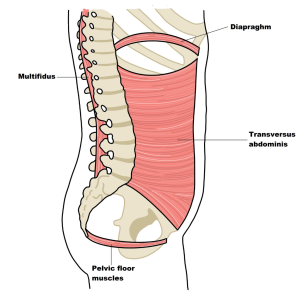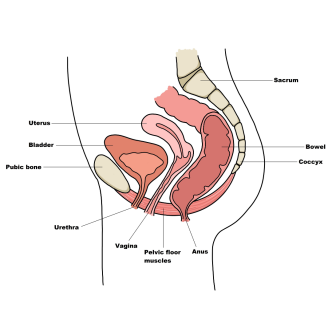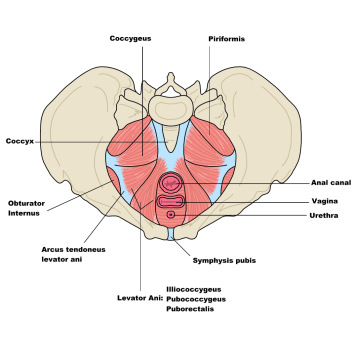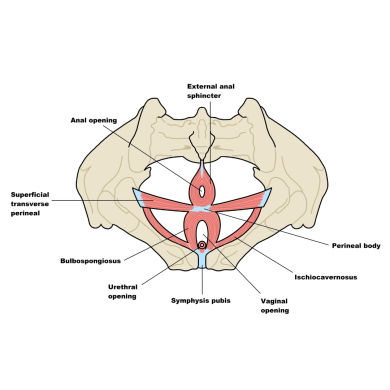Willis Street Physiotherapy's pelvic health service is delivered by trained pelvic health physiotherapist, Arantzasu Morales.
What Pelvic Health means and what are the pelvic floor muscles?
Pelvic health is a term used to describe the optimal functioning of the pelvic region, including the bladder, bowel, reproductive organs and pelvic floor muscles (PFM).
The pelvic floor is made up of a sling of muscles, ligaments and fascia that separate the pelvic cavity from the perineal region, supporting our bladder, intestines, rectum and reproductive organs. Among their main functions are to:
- Support the abdominal and pelvic viscera
- Maintain continence
- Allow voiding, defaecation, sexual activity and childbirth.
The PFM are separated most commonly in two layers:
- The deep layer includes the coccygeus and Levator Ani Muscle (LAM), the latter formed by 3 muscles: pubococcygeus, puborectalis and iliococcygeus muscles.
- The superficial layer includes the superficial transverse perineal, ischiocavernosus, and bulbospongiosus muscles.




What is a pelvic floor dysfunction and what conditions can be treated?
Pelvic floor dysfunction is defined as abnormal function of the PFM and includes conditions that can have significant adverse impacts on someone’s quality of life, among them we can find:
- Urinary incontinence
- Faecal incontinence
- Chronic constipation
- Pelvic organ prolapse (POP)
- Sexual dysfunction
- Pelvic girdle pain (PGP)
- Chronic pain syndromes, such as recurrent lower back pain or pelvic pain.
Despite being common during pregnancy and after birth, pelvic health conditions can be present in women and men of all ages and reproductive status. Evidence supports as first-line of treatment conservative management with a Pelvic Health Physiotherapist.
At this time our service does not treat anatomical male pelvic floors however we hope to provide this service in the future
How do I know if I might need a pelvic health assessment?
Here we have some questions to help you decide if you might need a pelvic health session. If you reply yes to one or more of them, book an appointment with a pelvic health therapist.
- Do you have any bladder or bowel incontinence/leakage?
- Do you ever leak when coughing, sneezing, lifting objects and/or exercising?
- Do you feel sudden urgency to urinate?
- Do you feel any heaviness or dragging in the vagina, or something “just not right”?
- Do you see anything at the entrance of your vagina?
- Do you suffer from pelvic pain?
- Do you experience pain with intercourse?
- Did you experience any perineal or vaginal tears during childbirth?
- Do you suffer from recurrent lower back, sacroiliac or hip pain?
- Have you been diagnosed with Irritable Bowel Syndrome (IBS) or constipation?
If I’m pregnant or postpartum, when can I have an internal assessment?
If pregnant, recommended after 12 weeks of gestation (higher risk of miscarriage before that period).
If postpartum, 6 to 8 weeks after giving birth (once the healing process is complete).
What if I have been referred to pelvic health physiotherapy after surgery?
We will discuss the details of your surgery on the day of your session, but at the time of booking your appointment, please let us know in advance any relevant details to make sure we can provide the best care possible.
What is Pelvic Health Physiotherapy and what can I expect from a first session?
Pelvic Health Physiotherapy consists of the examination and treatment of both internal and external components of the pelvis. Your session will start with your physiotherapist asking you certain questions regarding your pelvic health, medical history, activities and restrictions. As well, what are your goals and expectations so we can create a treatment plan specific to you.
External assessment
During an external examination, we assess your joints, ligaments and muscles that are in close relationship to your pelvis. As well, we will observe your perineum during relaxation, contraction and Valsalva maneuver. External palpation of your perineum might be performed to assess sensitivity and/or pain, as well the condition of any scarring.
Internal assessment
Commonly during your first session an internal assessment will be performed, but this will only be undertaken with your fully informed consent. Keep in mind that this will not be performed if you are not ready/comfortable about this or there are contraindications for this assessment. These can be discussed on the day with your physiotherapist.
During an internal examination, PFM are assessed for tone, elasticity, and areas of tenderness and pain. With a water-based lubricant your physiotherapist may insert one or two gloved fingers into your vagina and/or rectum to palpate your PFM from the inside. This is to properly evaluate your ability to perform voluntary contraction and relaxation of your PFM, as well assess their coordination, muscle length, strength and endurance. An assessment for POP or Levator Ani Avulsion can be performed too.
How can pelvic health physiotherapy help me?
Depending on the findings during your first assessment your physiotherapist will develop a pelvic floor muscle training programme specific to you, suggest lifestyle changes, provide toileting advice concerning your bladder and bowel, activity recommendations, self-testing and pain management strategies, if suitable. Education is one of the strongest tools of pelvic health.
As part of your treatment, stabilisation and strengthening of your major group muscles might be included, as well as breathing and relaxation techniques.
Can I still have a pelvic health session even if an internal examination cannot be performed?
Yes, you can. Internal examination is the best method to examine your pelvic floor muscles and search for prolapse, avulsion and/or other injuries, but external palpation is possible. Keep in mind that assessing your pelvic floor muscles is only one part of the assessment and one part of the treatment. We will address any necessary lifestyle changes, bigger group muscles, postural changes, among others, during your session.
How many sessions and how often will I need a follow up session?
This always depends on each patient, but following your first session you might be asked to return in a week or two. From there, your sessions are spaced out every couple of weeks or months, and at some point only once a year for a reassessment. Typically consists of 4-6 sessions, although keep in mind that some patients might only visit us one time for an assessment and self-management strategies.
Why seeing a pelvic health (PH) physiotherapist?
PH physiotherapist have received specific training to assess and treat conditions where pelvic floor muscles might play a role in, but they also consider other factors such as: your sleep quality, lifestyle, hydration, diet and food intolerances, breathing disorders, any mental and emotional factors that might be contributing to your symptoms or how your symptoms have impacted your general wellbeing.
The pelvic floor muscles are usually overlooked despite being part of your core muscles, so they should be assessed as any other, especially if it is suspected they need help. Of course, keep in mind that your posture, the role of other group muscles, general strength and stability will also be considered by your PH physiotherapist.
Is pelvic health physiotherapy covered by ACC? Do I need a referral?
You don’t need a referral to come to see a Pelvic Health Physiotherapist.
Only maternal birth injuries occurring after 1st October 2022 are currently covered by ACC. If you haven’t made a claim before with your midwife or surgeon, your Pelvic Health Physiotherapist can help you with this.
How much will my appointment cost?
How do I book an appointment?
To book a pelvic health appointment you can either phone or email our friendly reception team, alternatively, you can book an appointment online via the link below;
Book Online: Link here
Phone: 0800842749
Email: info@willisstreetphysiotherapy.co.nz



